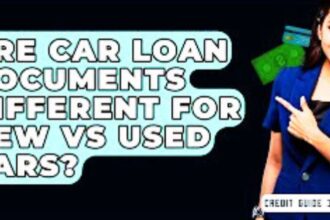Buying a car often requires significant financial planning. Many people don’t have enough savings to purchase a car outright.
That’s where financing options like a car loan vs personal loan come in. These two choices have distinct advantages and disadvantages.
This guide compares both loans in detail. Read on to find out which option best suits your needs and budget.
What Is a Car Loan?
A car loan is a type of secured loan. The car you buy acts as collateral for the loan.
Banks, credit unions, and dealers offer car loans. Interest rates vary depending on your credit score and down payment.
Car loans usually have fixed repayment terms, ranging from 3 to 7 years.
What Is a Personal Loan?
A personal loan is an unsecured loan. It doesn’t require any collateral.
These loans can be used for many purposes, including buying a car.
Because of the higher risk for lenders, interest rates on personal loans are often higher than car loans.
Key Differences to Know
Loan security matters
Car loans are secured, while personal loans are unsecured. This affects approval, rates, and loan terms.
Interest rates comparison
Car loans generally have lower interest rates because the vehicle is collateral. Personal loans carry higher risk and cost more.
Usage flexibility
Personal loans can be used for anything. Car loans are strictly for buying a vehicle.
Down payment needs
Car loans often require a down payment. Personal loans may not need one, depending on the lender.
Ownership and lien
With a car loan, the lender holds a lien on the vehicle. For personal loans, you own the car outright.
Pros of Car Loans
- Lower interest rates
- Longer repayment terms
- Easier approval with good credit
- Car acts as collateral
Cons of Car Loans
- Restricted to vehicle purchase only
- Requires a down payment
- Vehicle can be repossessed
Pros of Personal Loans
- Flexible usage
- No need for collateral
- Quick processing and disbursal
Cons of Personal Loans
- Higher interest rates
- Shorter repayment period
- Harder approval for poor credit
When to Choose a Car Loan
Choose a car loan if:
- You want a lower interest rate
- You’re buying a new or used car
- You have a good credit history
- You’re okay with a down payment
When to Choose a Personal Loan
Choose a personal loan if:
- You’re buying from a private seller
- You want to avoid down payments
- You want to use extra funds for other needs
- You lack collateral
Credit Score Impact
Loan approval criteria
A higher credit score helps in both cases. However, car loans are more forgiving because they’re secured.
Interest rate variations
Better credit scores mean lower rates. Personal loans have a wider rate range based on your score.
Repayment Terms Compared
Car loans usually offer 36 to 84 months. This helps lower monthly payments.
Personal loans often range from 12 to 60 months. Monthly payments may be higher.
Application Process
Car loan application
- Choose a lender
- Select a vehicle
- Provide income proof and ID
- Wait for approval and lien processing
Personal loan application
- Choose lender and loan amount
- Submit basic documents
- Approval within hours or a day
Loan Approval Speed
Personal loans are generally approved faster. Car loans may take a few days, depending on the vehicle and lender.
Final Costs and Fees
Car loans may have dealership or lender fees.
Personal loans may have origination or processing fees.
Always check the annual percentage rate (APR).
Trusted External Links
Conclusion:
Understanding the differences in car loan vs personal loan options helps you make a smart decision.
Car loans are best for lower costs on car-specific purchases.
Personal loans offer flexibility if you need cash for more than just a vehicle.
Compare your credit score, budget, and financial goals before applying.
Always read the fine print and choose a trusted lender for your loan.










